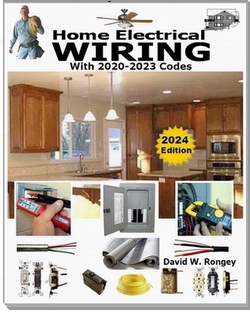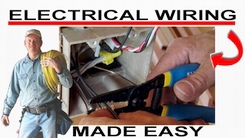» Need Electrical Help? Ask the Electrician
Wire Stripping
 |
By Dave Rongey
Summary: Electrical Wiring Question: I noticed a few web sites warned about not getting nicks in the wires as your stripping them. © By: Dave Rongey |
Wire stripping
Electrical Troubleshooting Question:
I noticed a few web sites warned about not getting nicks in the wires as your stripping them. I only found this mentioned on a few web sites but it got me wondering about it. Is this really true or not because using wire nuts to connect wires or wiring a switch(screwing the wire down) is going to scratch up the wires anyway?
When I unscrewed the last wire nuts I used, I saw it had cut deep gashes in the ends of the wires(18ga) I was connecting. If its true, what should I consider a nick: a deep cut, a scratch, or anything I can feel that isn't smooth?
Almost every time I strip the wire, there is at least some nick or scratch at the cutting/stripping point, sometimes hidden by the insulation.
Thanks for any help Mike.
Hi Mike, Great Electrical Repair Question!
I think the main concern is to not nick the insulation, however a severe nick in the copper or aluminum wire could cause the wire to break off. The only time this could really be a problem is when a person uses a pair of wire strippers and uses the wrong gage, for example stripping a #12 in the #14 slot. This can cause the wire to break off. I would not worry about the marks the wire nuts put on the wire, that is the spring material that grips the wires and keeps them together firmly. The same goes for the marks made on the wire from the terminals of a switch etc. You want the wire to be firmly tight, not just snug. Be very careful when it comes to internet advise, there are a lot of unqualified people answering questions who have never worked in the field as an electrician!
Thank you for the information. I thought the same thing about taking advise from the internet but the article came from PopularMechanics.com and I wasn't sure how credible they were
The little I knew about that magazine was for automotive advise.
The article is at http://www.popularmechanics.com/home_journal/tools/1274236.html?page=2 Here is what some of it says: "That last point is an important one. If you nick a conductor in the process of stripping it, you've created a stress riser that could lead to a crack forming. This is especially the case with connections that experience a heavy current load. The heating and cooling action can cause a nick to form into a crack. Eventually, the current can end up traveling through a much smaller cross section than the original wire had. The result is that the wire gets overheated and this further propagates the crack. Eventually the wire will burn through. Aside from the risk of fire, this can also lead to an open circuit. There are several things you want to avoid. Most importantly, don't nick the conductor. Pay attention and insert the wire into the correct stripping hole. Properly stripped wire has no tool marks on it."
I just can't see how that last statement can be true unless you use a gauge one size larger to cut your wire, and then twist the insulation off.
Thanks













